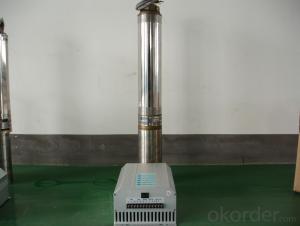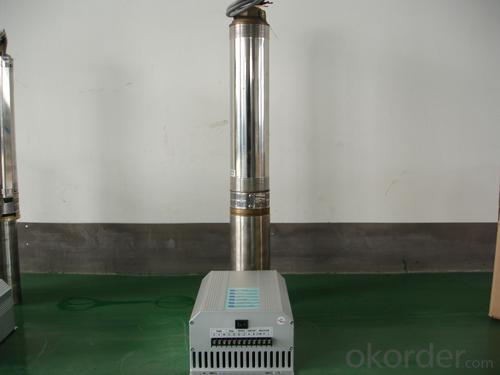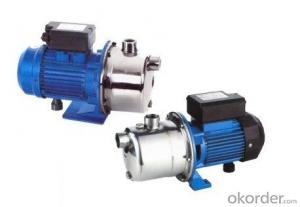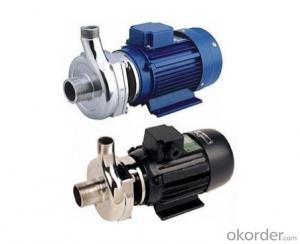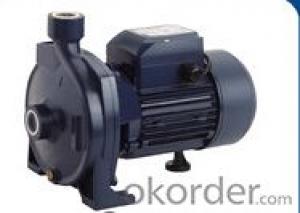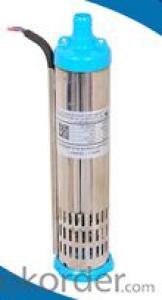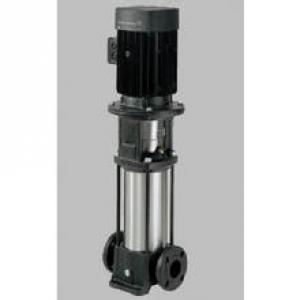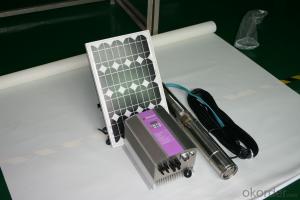Small Solar Water Pump
- Loading Port:
- China Main Port
- Payment Terms:
- TT OR LC
- Min Order Qty:
- -
- Supply Capability:
- -
OKorder Service Pledge
OKorder Financial Service
You Might Also Like
Item Description :
This superb new addition to our solar fountain range comes with a 10w solar panel,and a powerful fountain pump that is capable of producing fountains of up to 2m in height. As well as being easy to set up and use.Instruction manual is supplied for assembly and maintenance.
Solar Fountain Key Features :
Powered by direct sunlight
No high voltage electric mains required
Safe for children
Max. height of fountain: 2M
Max. flow capacity: 800 L/H(176 GAL)
10W Polycrystalline solar panel included
18V DC brushless pump
Solar Pump Features :
Can produce fountains up to : 2M (tube height) 1.4M (fountain height)
Comes with multiple nozzle accessories
Cable Length : 5M
Solar Panel Features :
10W peak power.
Polycrystalline highly efficient solar panel
Comes mounted in aluminium frame
Comes with ground stake and rotating knob so you can angle your panel toward the sun
What You Will Get :
10W solar panel
Solar pump
Ground Sake
Nozzle accessories
Precautions :
DO NOT alter or change the product itself or its components
Operate pump in freshwater only, never above 50 degrees celsius
Keep away from flammable liquids
Do not connect to any other power supply other than the included
- Q: How does a solar pump help in reducing noise pollution?
- A solar pump helps in reducing noise pollution by eliminating the need for traditional fuel-powered pumps, which are typically noisy. As solar pumps operate solely on solar energy, they do not produce any noise during their operation. This significantly reduces the overall noise levels in the vicinity and contributes to a quieter and more peaceful environment.
- Q: Are solar pumps suitable for use in mountainous regions with varying elevation?
- Yes, solar pumps are suitable for use in mountainous regions with varying elevation. Solar pumps are not dependent on a constant power supply and can operate efficiently in remote areas where grid electricity is not available. They can be installed at different elevations and are capable of pumping water to higher altitudes, making them a suitable choice for mountainous regions. Additionally, solar pumps can be easily integrated with other water management systems, making them versatile and adaptable to the varying terrain and elevation in mountainous regions.
- Q: Can a solar pump be used for aquaculture?
- Yes, a solar pump can be used for aquaculture. Solar pumps are increasingly being used in aquaculture systems to provide a sustainable and renewable source of energy for water circulation, aeration, and filtration. They are cost-effective, environmentally friendly, and can be easily installed in remote locations without the need for grid electricity. Additionally, solar pumps can help improve water quality and oxygen levels, contributing to the overall health and productivity of aquaculture systems.
- Q: What is the lifespan of a solar panel used in a solar pump system?
- The lifespan of a solar panel used in a solar pump system can vary depending on various factors such as the quality of the panel, maintenance practices, and environmental conditions. On average, a well-maintained and high-quality solar panel can last anywhere from 25 to 30 years. However, it is important to note that the efficiency of the panel may gradually decrease over time, resulting in a slightly reduced output. Regular cleaning, monitoring, and maintenance can help maximize the lifespan and performance of the solar panel in a solar pump system.
- Q: Can solar pumps be used in both shallow and deep wells?
- Yes, solar pumps can be used in both shallow and deep wells. However, the type and capacity of the solar pump required may vary depending on the depth of the well.
- Q: Can a solar pump be used in areas with limited access to water utilization?
- Yes, a solar pump can be used in areas with limited access to water utilization. Solar pumps are an efficient and sustainable solution for pumping water from various sources such as wells, boreholes, rivers, or lakes. They do not require grid electricity and can be powered solely by solar energy, making them suitable for remote locations. Solar pumps have the potential to provide a reliable water supply for irrigation, livestock, or domestic use in areas where traditional water infrastructure is lacking.
- Q: Can a solar pump be used for water supply in military bases or camps?
- Certainly, a solar pump can be utilized for water supply at military bases or camps. Solar pumps prove to be an exceptional choice for remote areas where access to electricity may be limited or undependable. They have the capability of offering a dependable and sustainable water source for various purposes such as drinking, cooking, bathing, and irrigation. Troops stationed at military bases and camps often require a steady and trustworthy water supply to fulfill their needs. By installing solar pumps, water can be drawn from wells, boreholes, or other sources, ensuring a continuous water supply. This is especially advantageous in areas where infrastructure may be scarce or non-existent, as it eliminates the necessity for expensive and intricate electrical systems or fuel-powered generators. Solar pumps are highly energy-efficient and operate by converting sunlight into electricity through the use of solar panels. Consequently, they are environmentally friendly and reduce reliance on fossil fuels. Moreover, solar pumps have minimal maintenance requirements, thereby reducing the need for frequent servicing or repairs. In military bases or camps, where security and self-sufficiency are of utmost importance, solar pumps present numerous advantages. They offer a reliable and independent water supply, diminishing the reliance on external resources. Furthermore, they can be effortlessly transported and deployed in different locations, making them suitable for temporary or mobile military operations. All in all, solar pumps present a pragmatic and effective solution for water supply in military bases or camps, providing sustainability, reliability, and cost-effectiveness.
- Q: Can a solar pump be used for water supply in refugee camps or disaster relief areas?
- Yes, a solar pump can be used for water supply in refugee camps or disaster relief areas. Solar pumps are an efficient and sustainable solution that can provide access to clean water without relying on electricity grids. They can be easily installed and operated, making them suitable for remote and off-grid locations. Solar pumps also have low maintenance requirements, making them ideal for challenging environments. Overall, solar pumps offer a reliable and environmentally friendly option for water supply in such areas.
- Q: What is the maximum depth a solar pump can draw water from?
- The maximum depth a solar pump can draw water from depends on various factors such as the power of the solar panel, pump efficiency, and the type of pump being used. However, on average, solar pumps can draw water from depths ranging between 100 to 500 feet, with some specialized models capable of reaching even greater depths.
- Q: Can a solar pump be used in conjunction with a battery storage system?
- Yes, a solar pump can be used in conjunction with a battery storage system. The solar panels can be used to power the pump during the day, and any excess energy generated can be stored in batteries for use during the night or when sunlight is not available. This combination ensures a continuous water supply even when solar energy is not being generated.
Send your message to us
Small Solar Water Pump
- Loading Port:
- China Main Port
- Payment Terms:
- TT OR LC
- Min Order Qty:
- -
- Supply Capability:
- -
OKorder Service Pledge
OKorder Financial Service
Similar products
Hot products
Hot Searches
Related keywords
